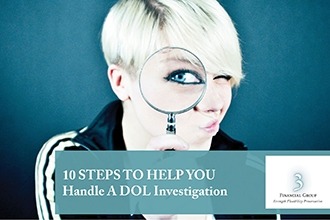Hot breath, fear, sweaty palms – You’ve received a request from the Department of Labor (“DOL”) to provide documents about your retirement plan. You are being investigated.
Your first thought may be, how did this happen? Why does the DOL care about my company’s retirement plan?
Whether it was a complaint from a plan participant, a referral from another agency, an error on your Form 5500, or simply the luck of the draw, you could spend the next 12 to 24 months becoming familiar with the DOL’s concern over how your plan’s fiduciaries carry out their responsibilities.
Before the Request: 5 Tips You Should Know
If you knew in advance that your plan was going to be investigated, how would you have prepared? As a best practice, all plan fiduciaries should take the following five steps:
1- Know who the plan’s fiduciaries are. This will be one of the first questions asked by the DOL, and they will be looking to understand the knowledge level of these fiduciaries.
2- Document your decision making. The DOL looks for written documentation showing how the plan’s fiduciaries carried out their responsibilities. The documentation should demonstrate the process that results in the decisions made in the best interests of the plan participants.
3- Get fiduciary training. Trying to learn as you go during an investigation can be problematic. Understanding ERISA’s fiduciary duties and how to properly administer plans ahead of time can make the investigative process much smoother.
4- Have good insurance. It’s a best practice to get fiduciary liability insurance related to your plan. You can even pay the premiums from the plan under certain conditions. Notably, some policies will cover the costs of investigations after the deductible has been reached.
5- Keep plan related documents organized. Having your plan-related documents organized and accessible prior to the investigation will make responding to the DOL much smoother.
During the Investigation: 5 Hassle-Saving Suggestions
Once you receive the notice of investigation requesting plan-related documents, how can you prepare for the process? The following steps should be taken:
1- Choose a primary contact. It is best to have only one person communicate with the DOL investigator throughout the process to eliminate confusion. All communications should be kind, respectful and courteous. Consider ERISA counsel as the primary contact as they can act as a translator to eliminate misunderstandings and often look for ways to streamline the process.
2- Negotiate the scope of the requests. The DOL intends to be reasonable in their requests for documents. If a request seems overly burdensome, explain the situation and the DOL might modify their request in an appropriate fashion.
3- Perform a review of the documents prior to production. Documents should never blindly be provided to the DOL. You (or your ERISA counsel) should review the documents to fully understand what is in them and to ensure that collections of documents are complete. If a negative is found (such as earning contributions have been late), it may make sense to report them to the DOL voluntarily.
4- Present the documents in a neat and organized fashion. When documents are provided to the DOL in a neat and orderly fashion, either on paper or electronically as requested by the DOL investigator, you are demonstrating that as fiduciaries you are organized. When documents are
presented haphazardly, it may cause the DOL concern about how the plan’s fiduciaries carry out their responsibilities.
5- Always be truthful. The DOL will request interviews with the plan’s fiduciaries. The interviews will feel similar to a deposition with the DOL asking questions about the plan and how the fiduciaries administer it. It is always key to be truthful in answering, even if it may be uncomfortable when you have noted an error such as late contributions (a favorite area of investigation by the DOL). Being truthful about errors commonly results in the DOL allowing voluntary efforts to fix them. The DOL is more likely to seek to penalize or enter into settlement agreements in the most egregious cases.
DOL investigations happen. Take the time now to clearly document your plan actions, explain why they were taken, and always remember to act in the best interest of plan participants. This way, if the DOL comes knocking at your door, you will be prepared.
 Joanna Amberger
Joanna Amberger
CERTIFIED FINANCIAL PLANNER™
3 Financial Group
1888 Kalakaua Avenue, Suite C312
Honolulu, HI 96815
808.791.2925
www.3FinancialGroup.com
This information was developed as a general guide to educate plan sponsors and is not intended as authoritative guidance or tax/legal advice. Each plan has unique requirements, and you should consult your attorney or tax advisor for guidance on your specific situation.
2020 © 401k Marketing, LLC. All rights reserved. Proprietary and confidential. Do not copy or distribute outside original intent.


